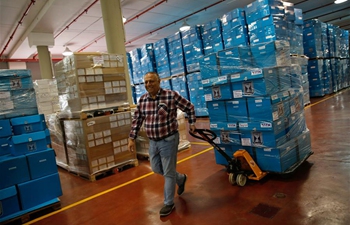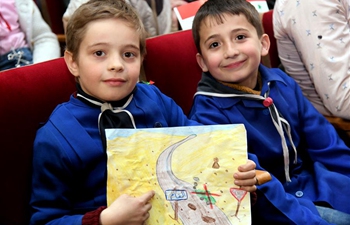ROME, March 8 (Xinhua) -- Every year on International Women's Day, international organizations call attention to the fact that females are underrepresented in science and do not develop as far as males in their careers.
According to the latest data from the UNESCO Institute for Statistics (UIS), just 28.8 percent of the world's researchers are women. Worldwide, the country with the highest percentage of female researchers is Myanmar at 85.5 percent and the country with the lowest is Chad at 4.8 percent.
In China, women account for 39.2 percent of scientific researchers, while Italy comes in at 36 percent, according to UIS as well as Observa Science in Society, an Italian think tank focusing on the interaction between science, technology and society.
"It's true that there is a glass ceiling: opportunities dwindle as you rise towards your doctorate, a research position, and a professorship," Cecilia Laschi, 50, an award-winning biorobotics professor at Italy's prestigious Sant'Anna School of Advanced Studies located in the Tuscan city of Pisa, told Xinhua in an interview.
"I don't know why that is, but the statistics confirm it," said Laschi, who co-authored 16 patents in Europe and Japan and helped found Robot-An, a robotics lab at Tokyo's Waseda University where Italian and Japanese researchers engage in avant-garde research together.
Among her many achievements, Laschi invented the I-Droid -- the personal robot which can speak, see, follow simple orders, simulate emotions, and learn by memorizing behaviors -- and the DustBots, which sweep city streets and pick up the trash.
She also spearheaded the field of soft robotics, or robots inspired by animals or plants made in soft materials such as silicone, which can potentially "deform themselves, grow longer, shorter, compress themselves or grow," she explained.
With funding from the European Union, Laschi and her team achieved a soft robot arm based on an octopus: it has an artificial skin with suction cups, it flexes, lengthens and retracts, works underwater as well as on land, and has been applied in medicine, surgery, underwater exploration, and assistance for the elderly.
Laschi, who earned a computer science degree from Pisa University in 1993, said she was one of a handful of female students in the department at the time.
"We were very insecure, or at least I was. Female students today are much more self-confident and at ease, also they have more skills and they know how to put them to good use," she said.
Loretta Del Mercato, 39, a materials enginer with a biotechnology degree who works in the field of medical nanotechnology, agreed with Laschi on the existence of the glass ceiling.
"The more you go forward, the fewer the women in managerial positions," she said. "But this has nothing to do with our capabilities -- for me there are no gender distinctions between men and women in terms of the capacity to deal with physics, chemistry, or engineering."
Del Mercato, a researcher at the National Research Institute (CNR), is developing in-vitro models of pancreatic cancer to bypass lengthy and expensive animal testing, which is being phased out at the European Union level on ethical and scientific grounds.
"Pancreatic cancer grows fast, and we don't have the luxury of implanting the tumor in an animal and waiting for it to take hold in the hope of testing this or that medication on it," she explained. "So for an oncologist to have tiny, reliable lab models to test different therapies opens up a lot of interesting possibilities."
Del Mercato said family attitudes are key in whether or not girls who want to be scientists end up following their dreams.
"My parents never let me think I couldn't make it as an engineer," she said. "Many girls get discouraged by their families and by stereotypes in school -- a lot of work needs to be done, beginning in kindergarten."
Del Mercato, who has two children with her lawyer husband, said it took "a lot of planning" to become a mother and keep her career afloat at the same time. She credited "an army of babysitters" and the support of "a forward-thinking husband who isn't a bigot" for her continued professional success.
She also pointed to two issues that make motherhood tough on working women in Italy: no child care facilities in the workplace, and short school hours that force women "to be taxi drivers for their kids, taking them from one activity to another".
"If I have to go nurse my baby in daycare three kilometers away, obviously I'm going to waste a lot of time," she said. "If my employer provides daycare in the building, he will be the first to profit because he will have a happy employee who takes 15 minutes to go nurse her baby, as opposed to one that leaves work an hour early."
Quantum physicist Miriam Vitiello, 39, has a PhD in physics and invented a quantum laser used in archeology and biomedicine: it located precious objects hidden within the Etruscan necropolis at Tarquinia, a UNESCO World Heritage site, and it is also the only instrument capable of detecting abnormal water contents in body tissues and organs -- a key tool to diagnose cancer.
"When I was a student there were certainly very few women studying in this field," Vitiello, who is also the mother of a small child, told Xinhua.
"My sector is predominantly male -- when I speak at conferences abroad, the audience is usually 99 percent male, and there will be two or three of us women at the whole event," said Vitiello, who sits on the scientific committees of over 40 international conferences, has published more than 150 papers in international journals, and delivered upwards of 70 talks at international conferences and over 30 lectures at universities around the world.
Vitiello explained that family can hold women scientists back in their careers. "Since my sector is cutting-edge and advances happen very quickly, any pause (such as maternity leave) can be dangerous, because the competition is very fierce," she said.
"It's also a field that requires a lot of travel: you must engage with scientists abroad, take part in meetings and workshops, so it's important to always be one step ahead," explained Vitiello, adding that she managed to keep her career on track because she never really stopped working while she took time off to have her baby.
Irene Bonadies, 36, has no children and graduated in 2006 with a doctorate in engineering from Naples University, which was founded in 1224 and is the oldest public university in Europe.
She said when she was a student, there was a "prevalence of men" in the engineering department, and recalled a mechanical engineering professor who once told a female colleague that "you're a woman, you can't understand machines."
Now, Bonadies' research at the CNR's Institute for Composite Polymers and Biomaterials (CNR-IPCB) focuses on creating artificial, intelligent tissue and organs that can communicate with the human body, stimulating it to repair itslef by using chemical signals as opposed to micro-computer signals, which she described as "the engineering aspects of nanomedicine".
"We must eliminate the prejudice that certain fields are tough, so only males can handle them -- no, all kinds of young women can go into these fields, because commitment is what counts most of all," she said.
With regard to the glass ceiling, Bonadies said: "There still aren't many women in management posts, and women don't get any help when they want to start a family," she said. "If you're a woman and you need time out from the lab to have a baby, you get shelved and when you come back, you have to work twice as much to get back to where you were."
Asked what advice they would give a 15-year-old girl with scientific ambitions, these four scientists did not hesitate: "I would tell her to do it, to follow her dream and to move forward with enthusiasm."













